As a seasoned Dungeons & Dragons player, I’ve seen countless adventurers step into the world of tabletop RPGs, eager to embark on epic quests and forge their own legends. But before any would-be hero can raise their sword or cast their first spell, they must first create their character – and that means understanding DnD stats.
It’s easy to feel overwhelmed by the complex web of numbers and rules that govern this fantastical universe, but fear not! In this ultimate guide, we’ll delve deep into the heart of DnD mechanics to demystify ability scores and give you the knowledge you need to build your perfect character.
Whether you’re a newcomer trying to make sense of it all or a veteran looking for ways to optimize your gameplay, there’s something in this guide for everyone.
We’ll break down each core stat – Dexterity, Strength, Constitution, Intelligence, Wisdom, and Charisma – exploring what they mean for your character both in-game and from a roleplaying perspective.
Additionally, we’ll discuss tips for optimizing your character’s stats as well as answering common questions like ‘What is the maximum ability score?’ and ‘How do proficiency bonuses work with stats?’.
By the end of this guide, you’ll have a solid grasp on how DnD stats work and be ready to take on whatever challenges await you in your next campaign.
1. Dexterity

Now, let’s dive into Dexterity and see how it influences your character’s agility and precision! As one of the six primary dnd stats, Dexterity plays a vital role in determining how nimble, swift, and accurate your character is. It affects a range of skills such as Acrobatics, Sleight of Hand, Stealth, ranged weapon attacks, and even finesse melee weapons.
A high Dexterity score can make your character an expert in evading danger and landing critical hits when it matters most.
To further understand the importance of Dexterity in dnd stats, let’s discuss its impact on three key aspects: Armor Class (AC), initiative rolls, and saving throws.
Your Armor Class represents how difficult it is for enemies to land a hit on you – the higher your AC, the more elusive you are. Dexterity directly contributes to this by adding your modifier to both light armor or no armor worn by your character.
Additionally, having a high Dexterity can grant you an edge during combat encounters through initiative rolls – these determine the turn order in battle. A quick reflex allows you to strike first or take evasive actions before others have a chance to react.
Lastly, let’s talk about saving throws – these are crucial checks made when faced with certain spells or environmental hazards that test your ability to endure or avoid damage. Dexterity-based saving throws often involve dodging fireballs or avoiding falling debris; having a high modifier here could mean life or death for your character!
Moreover, some classes like Rogues benefit greatly from their Evasion ability which turns successful Dex saves into complete damage avoidance! So not only does investing in this stat help keep you alive through sheer speed and grace but also bolsters other class abilities making you an invaluable asset at any adventuring party’s side.
As we delve deeper into our understanding of dnd stats like Dexterity’s influence on our characters’ performance within the game, it becomes clear that having a strong Dexterity score can mean the difference between success and failure.
Whether you’re a stealthy Rogue or a nimble Ranger, investing in this crucial stat will ensure your character is always one step ahead of their foes, navigating dangerous situations with ease and striking true when it counts.
2. Strength
While strength may seem straightforward, it’s actually a complex attribute that governs both raw power and physical prowess in the game. As one of the six core ability scores in Dungeons & Dragons, strength determines how well your character can perform tasks that require brute force or athletic finesse.
This can range from lifting heavy objects to climbing walls or even breaking down doors.
With a higher strength score, not only will you be able to tackle these challenges more effectively, but you’ll also likely find yourself feeling more connected to your character as their physical capabilities come into play during critical moments.
In addition to its impact on various skill checks and actions, strength plays a vital role in determining your combat effectiveness. Primarily affecting melee attacks and damage rolls, a higher strength score will improve your chances of landing devastating blows on enemies with weapons like swords, axes, and hammers.
However, don’t forget that other ability scores such as dexterity might be more important for certain class builds or weapon choices – so make sure you balance your character’s stats according to the type of adventurer you want them to be!
Moreover, strength-based characters often excel at grappling or shoving opponents; these are powerful control options that can dictate the flow of battle when used wisely.
When building your character and choosing which ability scores to prioritize based on their background and class preferences, don’t underestimate the value of having a solid foundation in strength.
Even if it’s not the primary focus for your particular build – say you’re playing an archer who relies on dexterity for accuracy – having some points invested in this stat will still provide valuable versatility during gameplay.
Whether it’s saving an ally from danger by lifting debris off them or finding creative solutions to overcome obstacles using sheer muscle power, remember that there are always ways for players with high-strength characters to feel included and integral within the story being told at any given moment!
3. Constitution
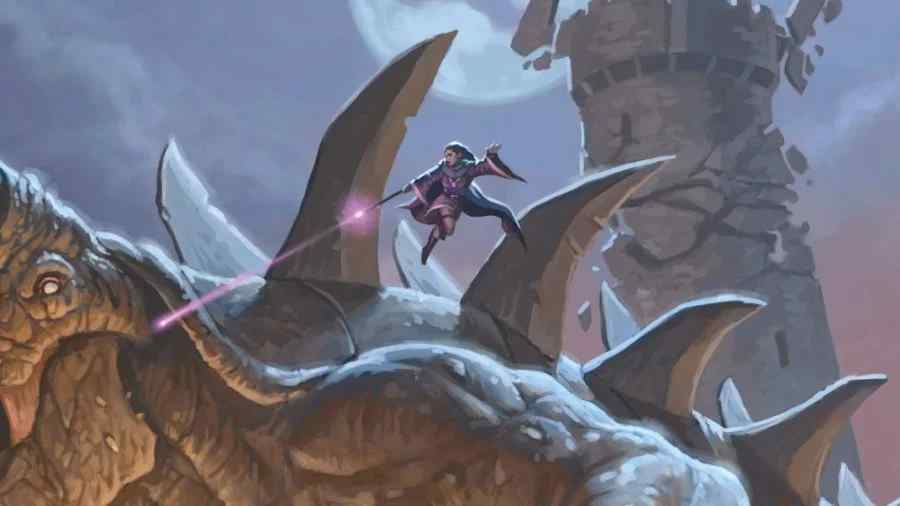
Delving into the realm of constitution, it’s crucial to recognize this ability score’s significance in determining your character’s overall health and resilience throughout their adventures.
As one of the six core character attributes in Dungeons & Dragons (D&D), constitution represents a character’s physical endurance, grit, and ability to withstand harsh conditions or injuries.
A high constitution score will enable your character to endure more damage, resist debilitating effects, and maintain concentration on spells even when under duress.
To paint a picture for the audience, let’s explore some key aspects of how constitution comes into play during gameplay:
- Hit Points: Your constitution modifier is added to each hit die you roll for gaining hit points at new levels. This directly affects your total hit points pool, with characters that have high constitution having more hit points overall.
- Saving Throws: Constitution saving throws are often used to determine if your character can resist or overcome various negative effects such as poison or diseases. A higher modifier can help them avoid these detrimental outcomes.
- Concentration Checks: When casting certain spells that require concentration, your character might need to make concentration checks (constitution saving throws) if they take damage while maintaining the spell. A better modifier improves their chances of keeping their focus intact.
As we navigate through the intricacies of D&D mechanics and storylines, our connection with our characters deepens – and understanding how vital roles like constitution play in those narratives only serves to enrich our shared experiences around the table.
By investing in this attribute wisely for your hero – whether they’re designed as a sturdy frontline warrior capable of taking immense punishment or a spellcaster who relies on raw determination to keep magic flowing amidst chaos – you’ll be giving them valuable tools for survival that will forge bonds not just between players but also between player and character alike.
So remember, next time you’re creating an adventurer who’ll brave dungeons deep and caverns old; don’t forget about fortifying their constitution, for it may well be the difference between thriving in the face of adversity and succumbing to a grim fate.
4. Intelligence
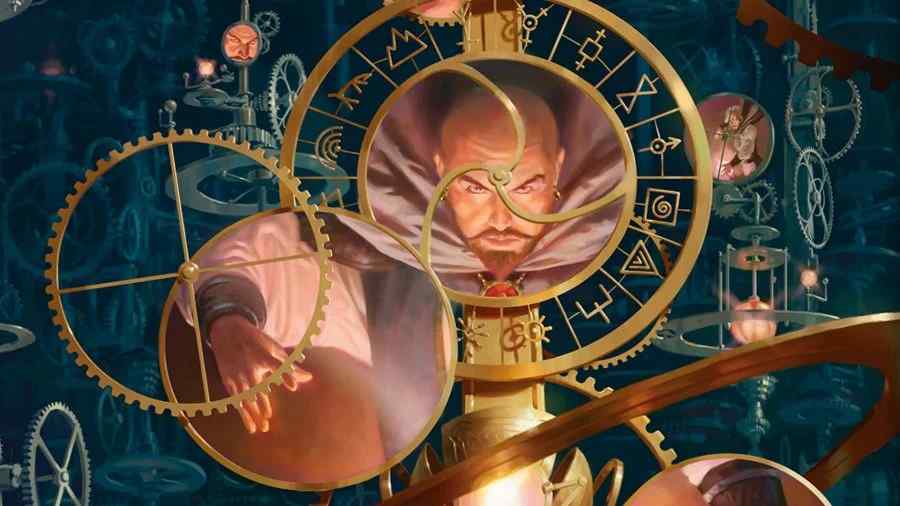
If you’ve ever wondered why your character keeps walking into clearly marked traps, it’s probably because you didn’t pay enough attention to their intelligence score during character creation.
Intelligence is one of the six core ability scores in Dungeons and Dragons, and it represents your character’s mental acuity, memory, and reasoning abilities. A high intelligence score can be crucial for certain classes like wizards who rely heavily on their knowledge of spells and arcane lore.
But even if you’re not a spellcaster, having a decent intelligence score can still benefit your character in various ways throughout your adventures.
When determining your character’s intelligence during creation, consider how well they would be able to solve puzzles or recall information about history or arcana. An intelligent character might be more likely to find creative solutions to problems or recognize patterns that others may miss.
Certain skills are also tied directly to the Intelligence ability score such as Arcana, History, Investigation, Nature, and Religion. A proficient investigator or knowledgeable scholar will undoubtedly have a higher intelligence than someone who relies solely on brute force.
A low intelligence score doesn’t necessarily mean that your character is useless; rather it means they might struggle with abstract thinking or rely more on intuition than logical reasoning.
Your party could benefit from having someone who thinks outside the box (or sometimes doesn’t think at all), leading to unconventional strategies that catch enemies off guard.
However, keep in mind that characters with very low intelligence scores may struggle when confronted with complex situations or when trying to communicate intricate plans with other party members.
So when creating your next D&D character, remember the importance of Intelligence – it just might save them from falling into yet another trap!
5. Charisma
Now let’s talk about Charisma, a crucial ability score that can make or break your character’s social interactions and persuasive powers in the world of Dungeons and Dragons.
Charisma is not merely about physical attractiveness or charm; it encompasses a wide range of traits such as eloquence, confidence, leadership abilities, and personal magnetism.
This ability score has a significant impact on various aspects of gameplay – from roleplaying through negotiation with NPCs to casting spells as certain classes like Bards or Sorcerers.
A high Charisma score can prove invaluable when navigating the complicated relationships that often emerge within dungeons and dragons campaigns. Skill checks related to persuasion, deception, intimidation, and performance are all influenced by your character’s Charisma modifier.
For instance, if you need to convince an NPC to help you on your quest or deceive a town guard into letting you pass without question, having a strong Charisma will give you an advantage in these situations.
Furthermore, characters who excel in leadership positions such as party faces (the spokesperson for the group) benefit immensely from high Charisma scores.
Beyond skill checks and social scenarios, some classes rely heavily on their Charisma ability scores for spellcasting purposes. Bards, Sorcerers, Warlocks, and Paladins all use their charisma modifier when calculating spell attack bonuses and saving throw DCs for their class-specific spells.
These characters harness the power of their innate presence or connection with supernatural forces to cast powerful magic upon themselves or others around them.
All in all, whether it’s charming your way through sticky situations or tapping into magical prowess fueled by sheer force of personality—Charisma is an essential attribute for any adventurer seeking success in the world of Dungeons & Dragons!
6. Wisdom

In the realm of Dungeons & Dragons, Wisdom holds a profound significance for adventurers seeking to navigate challenges both physical and mental with keen insight and intuition.
As one of the six primary ability scores in dnd gameplay, Wisdom represents your character’s perceptiveness, common sense, and willpower.
A high Wisdom score not only aids in making crucial decisions but also enhances certain class abilities and skill checks. To better understand how Wisdom works in D&D, let’s break down its impact on various aspects of gameplay:
- Ability Modifiers: Depending on your character’s Wisdom score, you’ll receive an ability modifier that affects specific skills, saving throws, and spellcasting abilities. For example, clerics use their Wisdom modifier to determine the potency of their spells.
- Skill Checks: Skills such as Perception (spotting hidden objects or sensing danger), Insight (detecting lies or motives), Survival (tracking creatures or navigating terrain), Medicine (healing others) rely heavily on your character’s Wisdom score.
- Saving Throws: When faced with specific spells or effects targeting your character’s mind or senses, they may need to make a Wisdom saving throw – this is where a higher score can help resist these potentially harmful effects.
- Spellcasting Classes: Clerics, druids, rangers, and some paladins depend on their wisdom as it directly impacts their spellcasting abilities – from determining the number of prepared spells they can have each day to affecting the difficulty level enemies face when attempting to resist those spells.
As you progress through various campaigns in D&D as an adventurer who values insight over brute force at times; you’ll find that wisdom serves as a lighthouse guiding you through treacherous waters filled with deceitful foes and cunning traps.
Whether playing as a wise cleric healing comrades from harm’s way or a perceptive ranger tracking elusive prey – embracing wisdom offers endless possibilities for growth within this fantastical world.
So, when creating your character, remember the importance of wisdom and how it can shape your journey as an adventurer in the vast expanses of Dungeons & Dragons.
What is the Best Stat in DnD?
There’s no definitive answer to which stat reigns supreme in the realm of Dungeons & Dragons, as each one holds unique value and shapes your character’s journey in distinct ways.
The best stat for your character will largely depend on their class, race, and role within the party. While some players may prioritize combat prowess with high Strength or Dexterity, others might focus on spellcasting abilities through a high Intelligence or Wisdom score.
Ultimately, it is up to you as a player to decide which stat best aligns with your character concept and playstyle.
Here’s a quick comparison of the six core stats and how they impact different aspects of gameplay:
| Stat | Combat | Social Interaction | Exploration |
|---|---|---|---|
| Strength | Melee attack/damage | Intimidation | Carrying capacity |
| Dexterity | Ranged attack/damage | Sleight of Hand | Stealth/Initiative |
| Constitution | Hit points/survivability | Endurance | Resilience |
| Intelligence | Spellcasting (some classes) | Knowledge | Investigation |
| Wisdom | Spellcasting (some classes) | Insight/Perception | |
| Charisma | Persuasion/Deception |
As you can see from the table above, each stat has its merits both inside and outside of battle. It is important to strike a balance between all six stats based on your specific goals for your character.
Remember that Dungeons & Dragons isn’t just about being the strongest or most powerful; it’s also about forging connections with others around the table and immersing yourself in an expansive world where anything is possible.
So don’t be afraid to experiment with different combinations of stats as you explore new characters and adventures – after all, embracing variety is part of what makes this game so magical!
How Ability Scores Impact Your Character
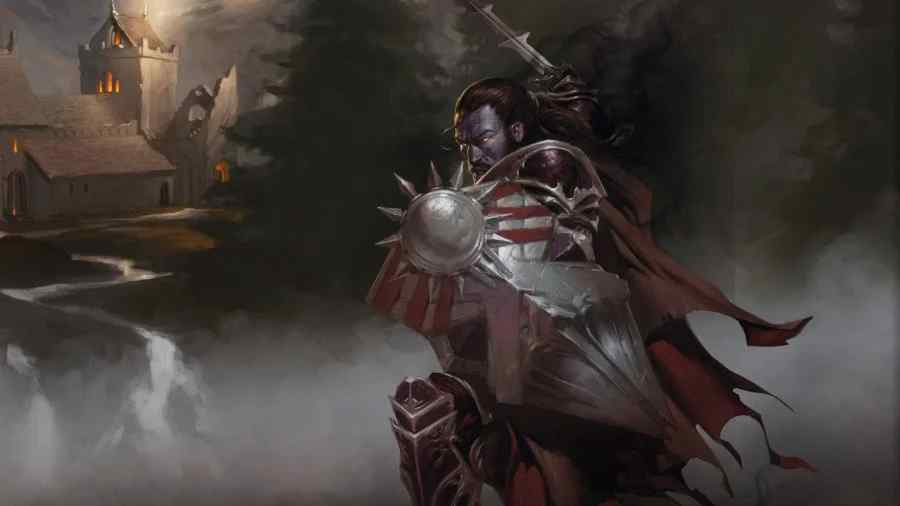
Discovering how ability scores shape your character’s abilities and interactions can truly enhance the thrill of roleplaying in Dungeons & Dragons! Each of the six ability scores – Strength, Dexterity, Constitution, Intelligence, Wisdom, and Charisma – play a crucial role in defining your character’s capabilities both in combat encounters and social situations.
By investing points into these stats during the character creation process or leveling up, you are essentially tailoring your hero to best suit your preferred style of gaming.
With higher scores come bonuses that impact various aspects of gameplay such as attack rolls, saving throws, skill checks, and more.
One key aspect to consider is how certain ability scores complement specific classes or archetypes. For example, a fierce Barbarian would benefit from high Strength and Constitution to make them a formidable melee combatant with increased health points and damage output.
On the other hand, a cunning Rogue might prioritize Dexterity for their nimbleness on the battlefield as well as sneaking around undetected. Similarly, spellcasters like Wizards and Clerics rely on Intelligence or Wisdom respectively for their magical prowess.
The synergy between class choice and focused ability scores creates an immersive experience where you truly feel connected to your character’s strengths and weaknesses.
Ability scores also have a significant influence on non-combat situations through roleplaying opportunities.
A charismatic Bard might charm their way past guards with ease due to their high Charisma score while an insightful Ranger could pick up subtle clues about impending danger thanks to their keen Wisdom attribute.
Even within social encounters among party members themselves, differences in ability scores can create interesting dynamics as characters may find common ground or clash based on varying levels of intelligence or moral values derived from their Wisdom stat.
In essence, understanding how each individual score impacts not only mechanics but also narrative elements allows players to forge deeper connections with both their own characters as well as those they encounter throughout their adventures!
Rolling for Ability Scores: Methods & Strategies
When it comes to rolling for ability scores, various methods and strategies can help you mold the perfect hero for your thrilling D&D adventures.
The method you choose will depend on your preferences as a player or Dungeon Master (DM), the type of campaign you’re participating in, and how much risk and randomness you want to involve while creating your character.
Some players enjoy the unpredictability of rolling dice, while others prefer more control over their characters’ strengths and weaknesses.
Regardless of your preference, understanding these methods will allow you to create a well-rounded character that fits seamlessly into your party.
The most common method for determining ability scores is the ‘4d6 drop lowest’ approach. In this method, players roll four six-sided dice (4d6) and remove the lowest roll from each set, then add up the remaining three highest rolls—this determines one ability score.
This process is repeated six times to generate all six ability scores: Strength (STR), Dexterity (DEX), Constitution (CON), Intelligence (INT), Wisdom (WIS), and Charisma (CHA).
Afterward, players can assign these values according to their desired class or build. This method tends to create above-average characters with few weaknesses but still allows for an element of chance in character creation.
Another popular method is point-buy, where players are given a predetermined pool of points to allocate across their abilities as they see fit. The standard point-buy system provides 27 points that can be distributed among the six abilities with each stat starting at 8 by default.
Players may increase or decrease their stats within a determined range—usually between 8 and 15—costing one point per increase or gaining one point back per decrease until they reach their desired stat distribution.
Point-buy systems cater more towards strategic thinkers who enjoy crafting specific builds without leaving anything up to chance.
Both methods have advantages and disadvantages depending on what kind of experience you seek during character creation. Rolling for ability scores with the 4d6 method can lead to more diverse and unpredictable characters, often resulting in unique role-playing opportunities and memorable stories.
On the other hand, point-buy systems give players a sense of control over their character’s destiny by carefully selecting their strengths and weaknesses according to their desired class or playstyle.
Whichever method you choose, remember that D&D is a game about teamwork, creativity, and shared storytelling—so embrace your character’s quirks and enjoy the journey!
Determining Ability Modifiers
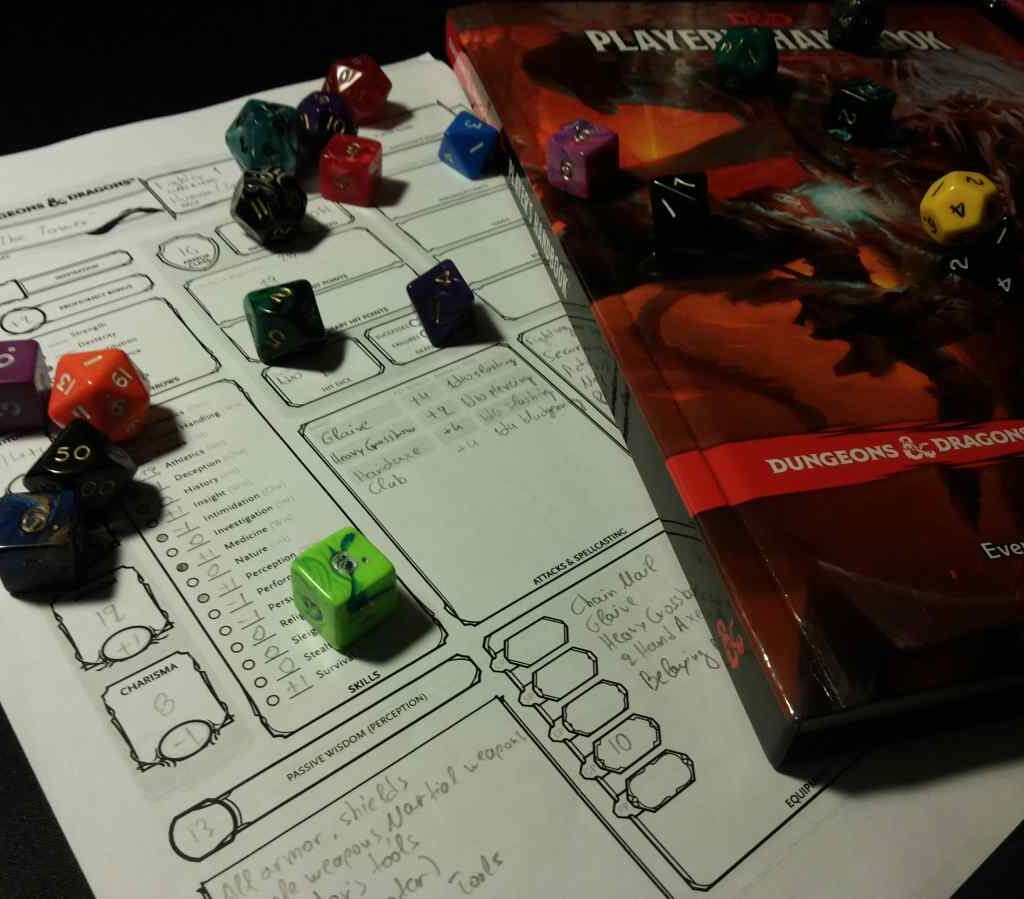
Now that you’ve got your ability scores figured out, it’s time to calculate those all-important modifiers that’ll give your character some real zest in gameplay—like adding a dash of hot sauce to an already-delicious meal.
Ability modifiers are the numerical representation of how proficient or efficient your character is with a particular ability. These modifiers will impact everything from combat effectiveness to social interactions, so understanding how they work and what they represent is essential for getting the most out of your Dungeons & Dragons experience.
To determine an ability modifier, simply subtract 10 from the corresponding ability score and then divide the result by 2, rounding down if necessary.
Positive numbers will generally help your character perform better at tasks related to that specific attribute while negative numbers may hinder their performance.
It’s important to note that negative modifiers can also emerge. For instance, having an Intelligence score of 8 would lead to an ability modifier of -1 due to rounding down after dividing by two.
When applying these modifiers in-game, remember that positive numbers will generally help your character perform better at tasks related to that specific attribute while negative numbers may hinder their performance.
As you continue on this epic journey through D&D’s mechanics and delve deeper into its rich lore and immersive world-building, consider each ability modifier as another puzzle piece contributing towards crafting an unforgettable story with friends around the table (or digital platform).
By taking ownership over these small but crucial details tied directly into gameplay, players can truly personalize their characters’ strengths and weaknesses while navigating complex scenarios crafted by experienced Dungeon Masters.
So go ahead—embrace those unique quirks granted through careful calculation or whimsical dice rolls because ultimately it’s those intricate nuances that keep us coming back for more thrilling adventures within this fantastical realm!
How Race and Class Influence Stats
As you dive into the world of Dungeons & Dragons, it’s essential to understand how your character’s race and class can shape their abilities and influence their overall performance.
Your character’s race grants innate bonuses, traits, and proficiencies that can complement or even enhance specific class features. On the other hand, your chosen class will determine your character’s skills, spellcasting abilities (if any), combat prowess, and overall playstyle.
When creating a new character or optimizing an existing one, carefully considering how race and class synergize can greatly impact your success in the game. Here are some factors to keep in mind:
- Racial Ability Score Increases: Each race has inherent ability score increases that directly affect certain stats. For example, elves gain a +2 bonus to Dexterity – making them excellent choices for classes that rely on agility like rogues or rangers. Conversely, dwarves receive a +2 bonus to Constitution – enhancing their resilience as fighters or barbarians.
- Racial Traits: Beyond ability scores modifiers, races also offer unique racial traits that may synergize well with particular classes. Half-orcs’ ‘Relentless Endurance’ trait allows them to survive fatal blows once per long rest – perfect for frontline warriors like paladins or barbarians who often find themselves in harm’s way.
- Class Abilities: Classes provide access to various abilities such as spells, special attacks, or support features at different levels throughout gameplay progression. These abilities often work best when paired with appropriate racial traits – e.g., playing a gnome wizard takes full advantage of their high Intelligence modifier and natural aptitude for magic.
- Multiclassing: Finally, some players choose to multiclass by combining two or more classes during character creation/progression in order to maximize synergy between race/class combinations and create unique playstyles not found within single-class characters.
Remember that while optimal stat distribution and synergy is important in any RPG system like Dungeons & Dragons, the true essence of the game lies in collaborative storytelling, role-playing, and making memories with friends around the table (or online).
Ultimately, it’s about creating a character you enjoy playing – whether that means min-maxing for maximum efficiency or taking unconventional race/class combinations to tell an engaging story. So don’t be afraid to experiment and embrace your creativity as you delve into the rich world of D&D!
Tips for Optimizing Your Character’s Stats
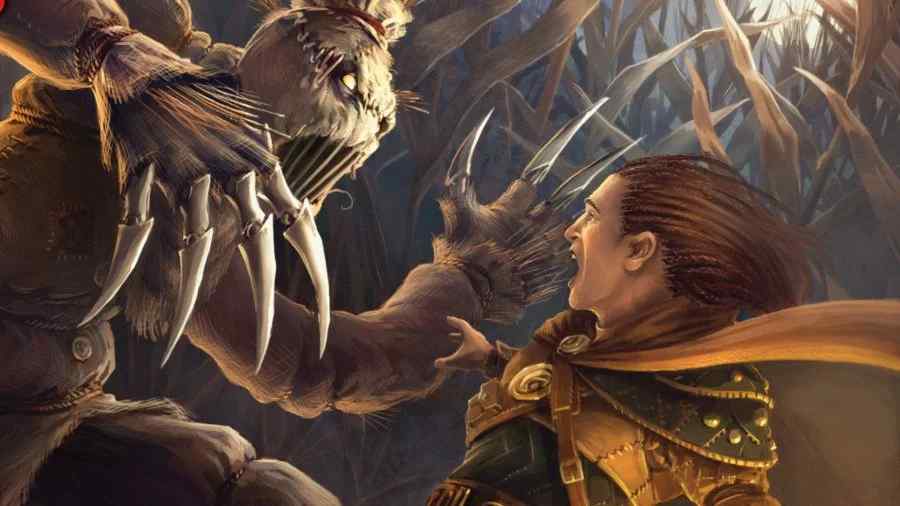
Imagine yourself carefully crafting a powerful and unique character, skillfully weaving together their abilities like a master blacksmith forging an exquisite sword. You know that selecting the right combination of race, class, and ability scores is essential for optimizing your character’s potential in the world of Dungeons & Dragons.
But fear not! I’m here to share some tips on how to get the most out of your hero or heroine’s stats while staying true to their backstory and personality.
First things first: let’s talk about ability score distribution. A common method for determining your character’s ability scores is through point-buy systems or rolling dice. Whichever method you choose, it’s crucial to allocate points wisely based on your chosen class and desired playstyle.
For example, if you’re playing a fierce barbarian with a penchant for crushing foes in melee combat, you’ll want high Strength and Constitution scores to maximize damage output and survivability.
On the other hand, if you envision your character as an enigmatic bard who uses charm and wit to navigate social situations rather than brute force, prioritize Charisma and Intelligence instead.
So now that we’ve established which stats are important for different classes, it’s time to consider how racial bonuses can further optimize those key attributes.
Most races provide bonuses to specific ability scores – tieflings gain a boost in Charisma and Intelligence while half-orcs receive boosts in Strength and Constitution – so make sure to take advantage of these racial traits by selecting one that complements your chosen class’ primary stat(s).
Additionally, don’t ignore other racial features such as proficiency in certain skills or unique traits that align with your envisioned playstyle; they can often be more impactful than mere numerical boosts!
By strategically combining these elements during character creation, you’ll forge a mighty warrior or cunning spellcaster whose story will be just as compelling as their prowess on the battlefield!
What is the Maximum Ability Score?
In the realm of Dungeons & Dragons, heroes strive to reach their peak potential by pushing their ability scores to the highest possible limits. As a player, knowing these limits is essential for understanding your character’s growth and progression throughout the campaign.
The maximum ability score varies depending on factors such as race, class, and magical enhancements. However, there are some general rules that apply across the board.
The natural maximum for an ability score is 20, but racial traits can increase an ability score beyond 20. Certain class features or feats may also raise this cap, and magical items or spells can temporarily or permanently boost an ability score even higher.
As you level up and explore various ways to enhance your character’s abilities, it’s important to keep these numbers in mind so that you can make informed decisions about your character’s development path.
By strategically choosing races with innate bonuses to key attributes or selecting specific classes and feats that synergize with your desired playstyle, you can create a hero who truly excels at their chosen role within the adventuring party.
Of course, reaching these lofty heights isn’t just about raw power; it’s also a testament to your character’s growth and perseverance in overcoming challenges throughout their journey in Dungeons & Dragons.
As your hero reaches new peaks of prowess through hard work and dedication (and perhaps a little luck), they will become a legend among their peers—a shining example of what any adventurer may achieve when they set their sights high and refuse to back down from any challenge thrown their way!
How Do Proficiency Bonuses Work With Stats?
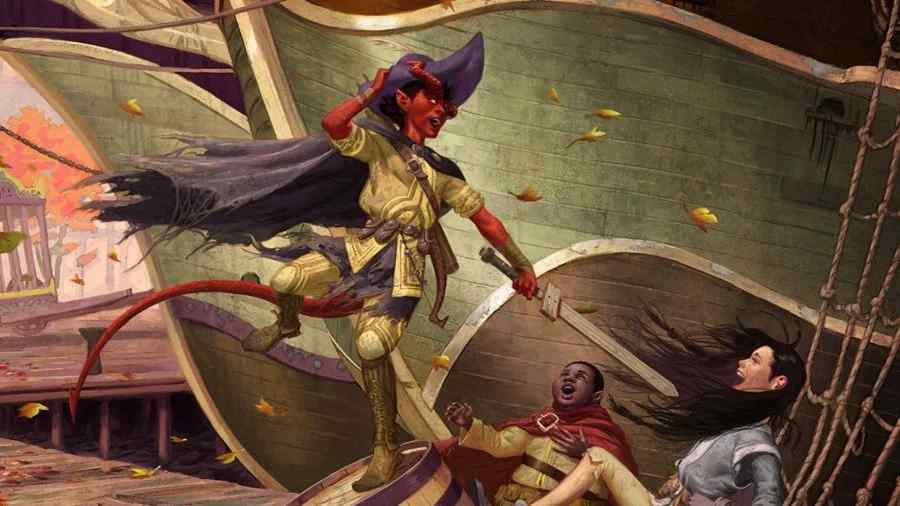
Proficiency bonuses can seem tricky, but fear not, we’ve got the lowdown on how they interact with your character’s attributes.
In Dungeons & Dragons, proficiency bonuses represent your character’s expertise in certain skills and abilities. As you level up, your proficiency bonus increases, reflecting your growing mastery of these areas.
Proficiency bonuses are added to ability checks and attack rolls when using a skill or weapon that you’re proficient in.
To determine how proficiency bonuses work with stats, let’s first look at ability scores and their corresponding modifiers. Each of the six core abilities (Strength, Dexterity, Constitution, Intelligence, Wisdom, and Charisma) has an associated modifier calculated by subtracting 10 from the score and dividing the result by 2 (rounded down).
These modifiers are then applied to various aspects of gameplay such as saving throws and skill checks. When you’re proficient in a particular skill or saving throw tied to an ability score, you add both the relevant ability modifier and your proficiency bonus to the roll.
For example: imagine you have a rogue with a Dexterity score of 16 (+3 modifier) who is proficient in Stealth. At level 1, their proficiency bonus is +2.
When making a Stealth check for this character, you would roll a d20 (a twenty-sided die), add their Dexterity modifier (+3), and also add their proficiency bonus (+2).
This means that even if they rolled poorly on the d20 itself—say they rolled a 5—their total Stealth check would still be an impressive 10!
So remember: when it comes to combining stats with proficiency bonuses in D&D games, it’s all about adding those sweet extra points onto rolls where your character excels!
How Can I Increase My Character’s Ability Scores?
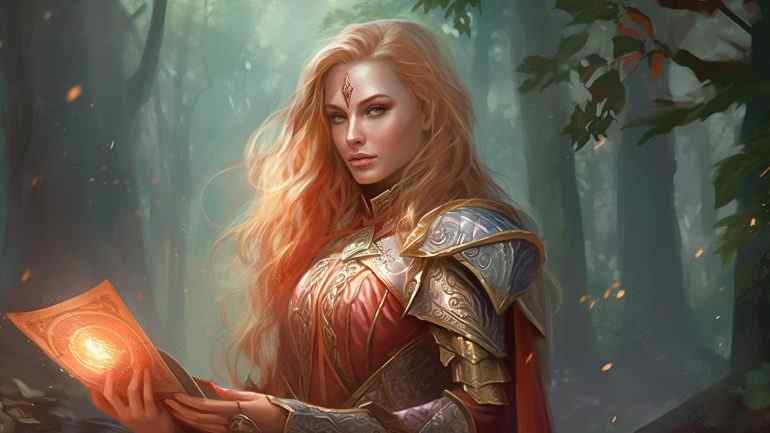
So you’re itching to boost your character’s ability scores and make them even more awesome, huh? Well, you’ve come to the right place. Increasing your character’s ability scores can be accomplished in various ways throughout your Dungeons & Dragons campaign, allowing them to become stronger, smarter, or more charismatic.
It’s important to understand the different methods available to increase these crucial stats so that you can make the most out of your character’s growth and development.
There are several ways to improve your character’s ability scores during gameplay:
- Leveling Up: When your character reaches certain levels (usually 4th, 8th, 12th, 16th, and 19th), they may receive an Ability Score Improvement (ASI). This lets you either increase one ability score by two points or two different ability scores by one point each.
- Feats: Instead of using an ASI for increasing ability scores directly when leveling up, some players may choose to take a feat. Some feats offer minor increases to specific abilities alongside other unique benefits.
- Magical Items: Throughout your adventures, you might come across magical items that grant bonuses to specific ability scores while worn or attuned. These bonuses vary in strength and duration depending on the item itself.
- Spells & Class Features: Certain spells and class features might temporarily boost a character’s abilities during gameplay. For example: enhance ability spell allows for temporary advantage on checks associated with a chosen stat.
- Manuals & Tomes: Rarely found within treasure hoards or as rewards from powerful NPCs are manuals and tomes that provide permanent increases (+2) in certain abilities if read over a long period.
By strategically planning which method best suits both their playstyle and their character’s strengths/weaknesses at any given moment in their journey through the world of D&D, players can ensure they’re always getting the most bang for their buck when it comes to increasing ability scores.
Ultimately, however, the key to success is not just about maximizing stats but also building a well-rounded character that creates a sense of belonging within your adventuring party and fully immerses you in the rich tapestry of the D&D world.
So, remember, as you seek out ways to improve your character’s abilities, never lose sight of what truly makes them unique and special.
Conclusion
In the end, it’s all about creating a memorable character that you’ll enjoy playing. With a solid understanding of D&D stats and how they affect your character’s abilities, you’re well on your way to crafting an epic adventurer.
Remember to optimize those ability scores and proficiency bonuses. But don’t forget to have fun with it!
After all, who wouldn’t want to be known as the charismatic rogue or the wise wizard in their party?

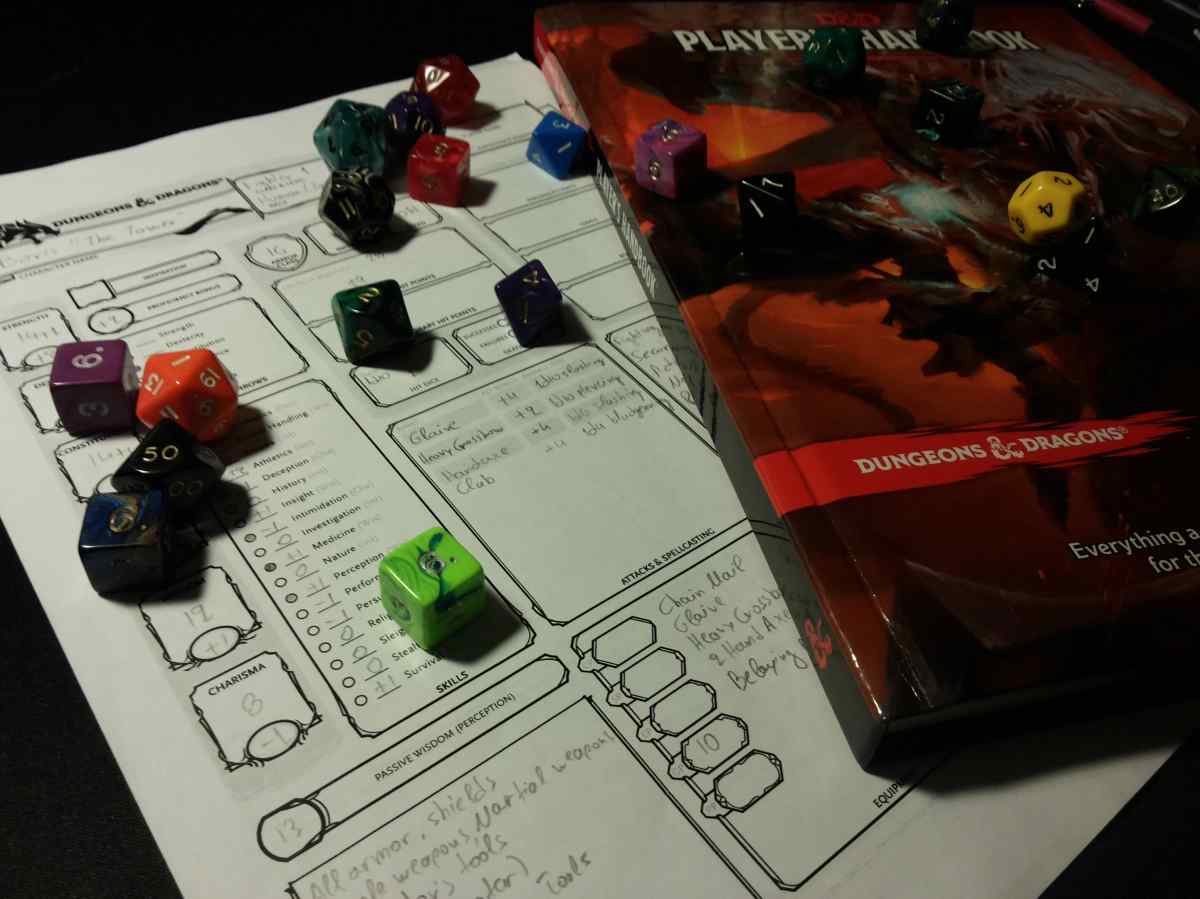





[…] Related: How Do Dnd Stats Work? […]